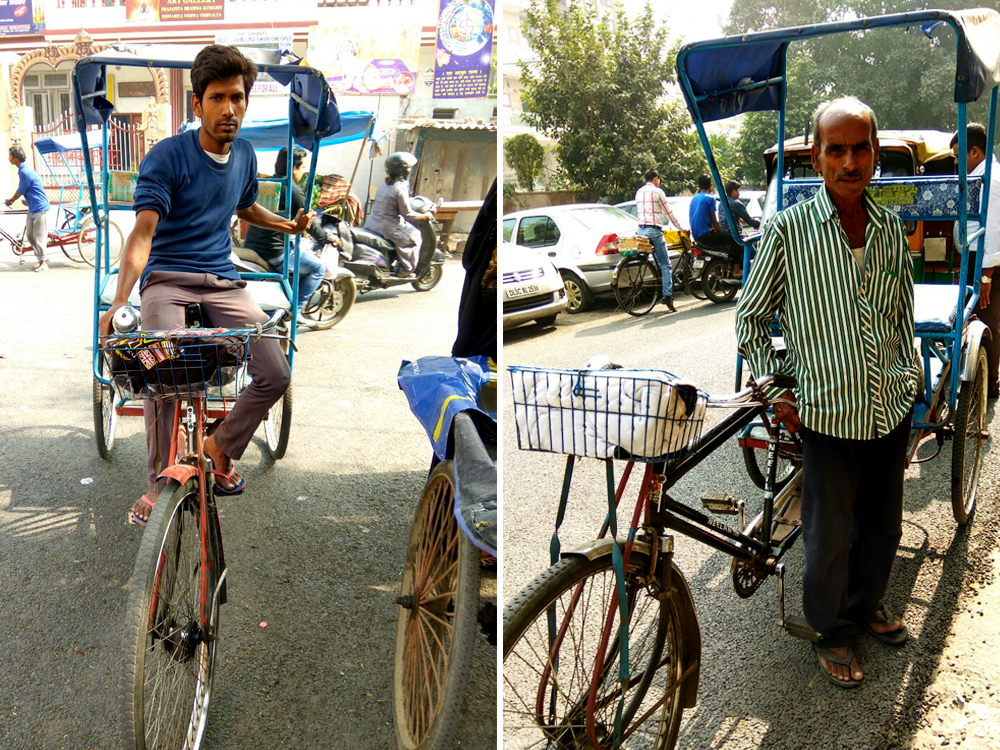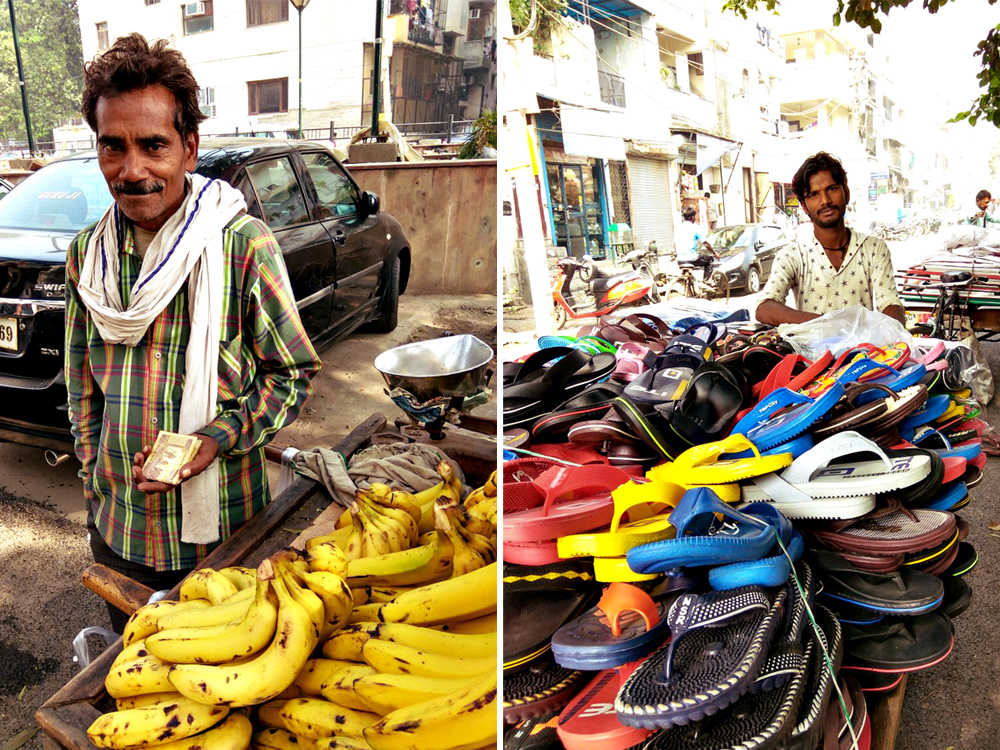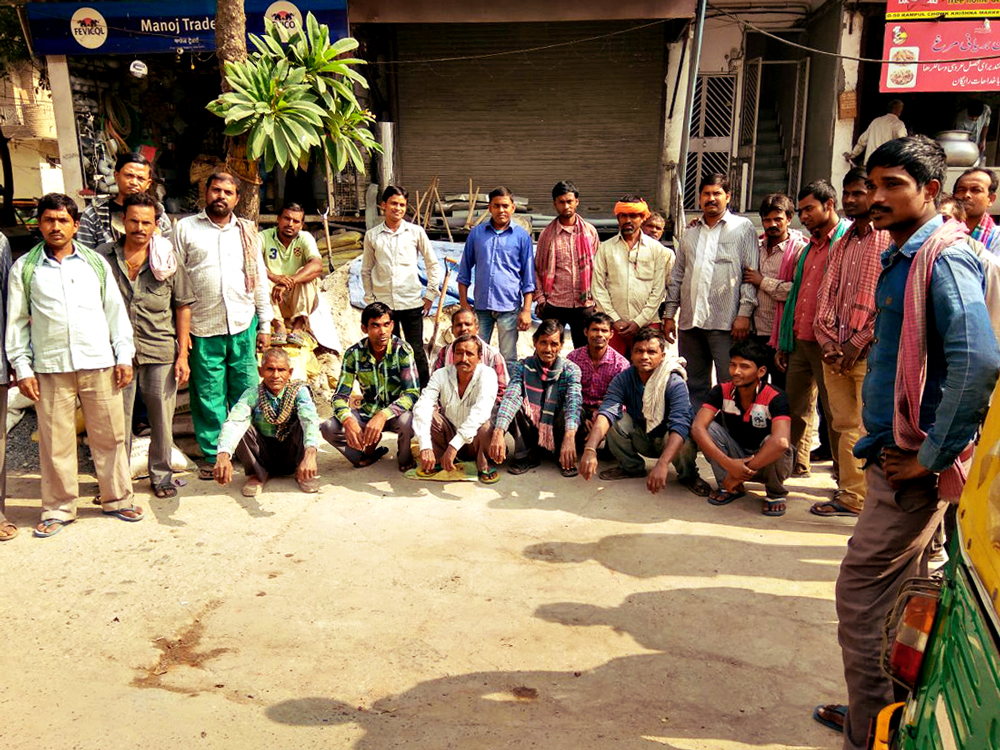“Main kahin ka nahin raha (I’m helpless; I’ve have lost everything),” says a rickshawpuller in New Delhi, visibly upset over the Prime Minister Narendra Modi-led government’s decision to pull out Rs 500 and Rs 1,000 notes from circulation overnight with the purported intent of curbing black money in the economy. Ironically, the rickshawpuller’s name is Nirash, meaning someone who’s disappointed in Hindi.
Nirash is from Samastipur in Bihar and has a family of six to feed back home — a wife, three daughters, a son and a daughter-in-law. He tried to send home Rs 1,000 on Wednesday morning, but the “courier” guys (local money wiring services) refused to take his money — two Rs 500 notes. When I ask him how much money he has in the scrapped Rs 500 and Rs 1,000 notes, he says, “Yehi kuch chaar-paanch hazaar (About Rs 4,000-5,000),” which is practically all his savings.
“Baal bachcha kya khayega ghar pe (What will my family eat),” he rues, for not being able to send them money, looking crestfallen.
The move has greatly inconvenienced the undocumented population in India — household help, labourers, kirana shop owners, housewives — who don’t have valid ID proofs and bank accounts
He doesn’t have a bank account in which he can deposit his cash; nor does he have an identity proof like an Aadhaar, pan card or voter’s card that one has to mandatorily produce at the bank to exchange the banned notes. He’s been running from pillar to post since morning, begging people to change his Rs 500 notes into smaller, usable denominations, but no one is willing to spare their small notes anymore. Moneylenders and shopkeepers are asking for a premium of Rs 100-200 for each note he wants exchanged, he says, which he can’t afford.
When I try to talk to him about mobile banking and wallets, he looks bewildered and confused (so much for BJP leaders insisting on news channels on Tuesday night that the common man can “easily” switch to mobile banking and digital wallets). Well, Nirash, and millions like him, don’t even have a phone, leave alone being aware of digital transaction methods. Eventually, to be sure, a market will evolve to service the needs of people such as Nirash. (This FAQ by India Today is a good reckoner on how, where and until when can people unlike Nirash change their notes or deposit their money at banks.)

The government is being lauded by many sections of the society for the bold financial move, which has been even termed as a “masterstroke” aimed at curbing black money in the Indian economy. But, what happens to the undocumented population in India — farmers, household help, labourers, kirana shop owners, small and medium businessmen, housewives — who don’t even have valid ID proof documents, let alone bank accounts? According to a World Bank report from last year, 21% of the world’s unbanked population is in India; the Bank reckons one in two Indians still don’t have a bank account.
Money is what money does
Girish, who sells fruits off a handcart in South Delhi’s Lajpat Nagar, is making good of the situation. He continues to accept Rs 500 and Rs 1,000 notes. He shows them off to me. He too doesn’t have a bank account or an ID proof. He’s banking on his supplier to deliver him of the notes, calling himself a mazdoor whose work is to sell as many fruits as he possibly can. “It’s the supplier’s headache. He will figure what to do with these notes. People with means always find a way,” he says. Of course, business is better than usual for him, because most vegetable and fruit sellers are not accepting these notes, something I figured when I spoke to others in the area.
But not everyone has Girish’s risk-taking attitude. Surinder, a vegetable seller in the same market, says business has been bad for him all day and there are hardly any people coming in. Although he has a bank account, his fear is that in the days to come he will lose a lot of his business to online grocery stores. He has a mobile but is not familiar with the concept of mobile wallets.
Most of these unbanked people working in the informal economy save their money in cash, stashed away under the bed, in a jar tucked away at the back of a cupboard, and even behind loose bricks in the walls or in earth-covered holes in the floor of their homes, almost like they show in the movies.

Take the case of Parvati, who works as a house help in Delhi. Parvati, in her late forties, hails from Nepal. She has been working in North Delhi for the past decade, but doesn’t have any documents to prove her residency here. Nor does she have a bank account. After Modi’s announcement Tuesday night, she’s in a fix. Her life’s savings amounting to Rs 70,000 are sitting with her in cash and she needed to use the money urgently. She was supposed to leave for Nepal today (Wednesday) for her daughter’s wedding. But her money is of no use now and she doesn’t know what to do.
There are fresh-off-board others who are trying to find their feet in the mess. Rintu Mondal, a rickshaw puller who moved to Delhi from West Bengal’s Malda district just last week, says the big city itself is so intimidating and confusing for him, and now he has this new “sar dard” (headache) to contend with. “Kichhui bujhte parchhina (I can’t understand anything),” he says, in his native Bangla, to me. He’s unbanked as well.
‘Notes’ from Bharat
Accounts such as these compel one to look at the other side of the story, to look at how Modi’s monumental decision has affected Bharat and it’s people. Is this huge part of our population and their hard-earned savings bearing the brunt of a financial decision that seems prudent to the rest of India? It should be noted that Modi’s move seems to have been well-received by the middle class and the social media brigade — #Modifightscorruption was trending all of Wednesday morning on Twitter.
Another point of concern is that the move has given moneylenders and touts ammunition to extort more money from the poor. A new breed of middlemen has emerged from the current situation to make money from India’s unbanked. Commentators such as marxist economist Prabhat Patnaik are expressing reservations about how much the government move will actually help in tackling black money, deeming the decision “anti-people” and “witless”.
“Garibon ke liye maut hai. Garibon ke liye jaanlewa hai”
— Pintu, a daily wage labourer, on the demonetisation
Phoni Mondal, a daily wage labourer, confirms people are taking advantage of their predicament by asking for extra money to convert the notes they have. Some shopkeepers, moneylenders are making a killing, he says. “They are asking for Rs 100-200 extra to exchange a Rs 500 note,” he says. Zeeshan, who hails from Ramzanpur village in Uttar Pradesh’s Budaun district and sells slippers on a handcart, voices the same concern. When I tried to speak to these moneylenders, I was shooed away.
The demonetisation has also given rise to an unhealthy competition among daily wage labourers for employment. It can only be expected given the fact that most of their savings are useless for now. Work is in any case hard to come by and they are dependent on daily earnings for sustenance.
I got a sense of this as I walked up to a group of daily wage labourers in Lajpat Nagar’s Ram Pul area to get their view on the matter. There were about 50 men hovering at the place, many of them sitting on their haunches. As I walked up to them and started talking to one, all of them descended upon me at once, in the hope that I was looking for somebody to do some manual labour.

It’s only when I told them that I’m a journalist and was there to understand how they’ve been impacted by PM Modi’s “surgical strike” — as the move is being dubbed by many — that they settled down. The men, who hail from Bengal and Bihar, say they all watched Modi’s address to the nation on a TV in a shop window on Tuesday night. “Mahabharat jaisa tha (It was like the Mahabharat),” one labourer jokes, referring to the days when Doordarshan beamed the epic mythology and people who didn’t have TV sets would sit outside shop windows in large numbers to watch the show.
When I ask them how many of them have bank accounts, only a couple of them raise their hands. “Garibon ke liye maut hai. Garibon ke liye jaanlewa hai (This decision is fatal for the poor),” a labourer called Pintu shouts out from the crowd. The rest join him in a chorus.
While these are just a handful of stories from some parts of Delhi, there are thousands, possibly millions, more such people across India who suddenly find themselves in the lurch — their only mistake being to keep their savings in their pillows.
Subscribe to FactorDaily
Our daily brief keeps thousands of readers ahead of the curve. More signals, less noise.
To get more stories like this on email, click here and subscribe to our daily brief.
Photos: Ramarko Sengupta Disclosure: FactorDaily is owned by SourceCode Media, which counts Accel Partners, Blume Ventures and Vijay Shekhar Sharma among its investors. Accel Partners is an early investor in Flipkart. Vijay Shekhar Sharma is the founder of Paytm. None of FactorDaily’s investors have any influence on its reporting about India’s technology and startup ecosystem.








